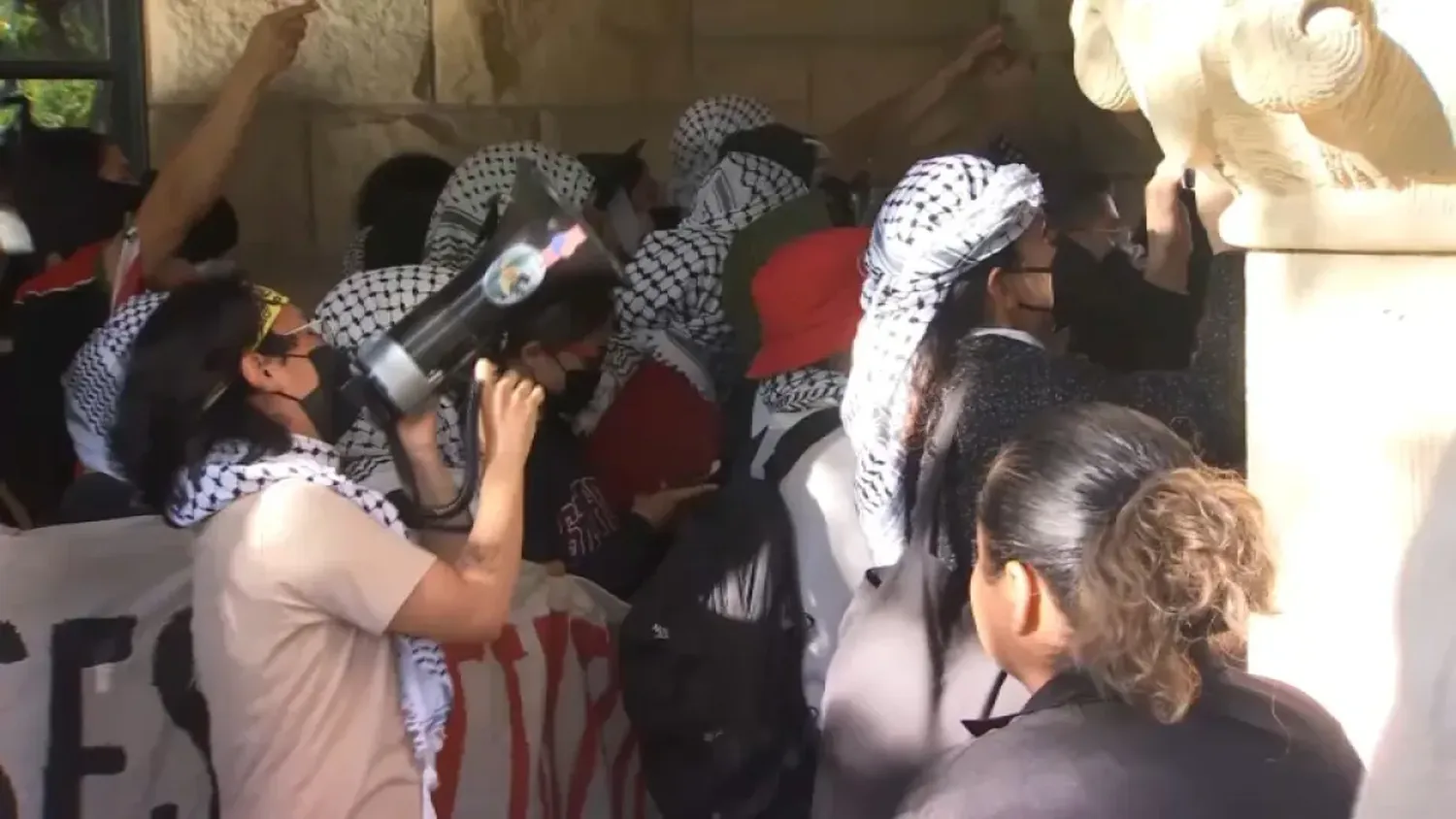Israel-Gaza War
13 Arrested, Officer Injured After Pro-Palestinian Protesters Barricade Inside Stanford President's Office
The protest escalates tensions on college campuses over the Gaza conflict between Israel and Hamas.
STANFORD, Calif. — In a dramatic turn of events early Wednesday morning, 13 individuals were arrested after a group of pro-Palestinian protesters, comprising Stanford University students and alumni, barricaded themselves inside the office of Stanford President Richard Saller. The protest, which resulted in significant damage to the building and an injury to a public safety officer, underscores the escalating tensions on college campuses over the Gaza conflict between Israel and Hamas.
The occupation began around 5:30 a.m. when the protesters entered Building 10, which houses the offices of the president and provost. The group, affiliated with Stanford for Palestine, declared their intention to remain inside until the university administration and the Board of Trustees addressed their demands. These demands included divesting from companies that provide material and logistical support to Israel's military operations in Gaza.
According to university officials, the protesters caused extensive damage to both the interior and exterior of the building. Graffiti adorned the historic sandstone walls, and an office desk was splattered with a red liquid. The protesters also renamed the president's office "Dr. Adnan's Office" in memory of Dr. Adnan al-Bursh, a Palestinian physician who died in an Israeli jail.
The protest was part of a broader movement on college campuses across the United States, where students have been calling for their institutions to sever financial ties with companies supporting Israel's military actions. Since October 2023, Stanford students have organized over 20 rallies, attempting to engage the administration in dialogue about their concerns. However, the university has consistently refused to negotiate, according to the protesters.
Stanford's response to the protest was swift and decisive. Within about two hours, law enforcement officers, including Stanford police and Santa Clara County sheriff's deputies, had broken into the building and begun making arrests. By 9:45 a.m., the building was cleared, and the protesters were detained at the Santa Clara County Jail.
A public safety officer was injured during the protest when he was shoved by protesters interfering with a transport vehicle. The university did not provide details on the officer's condition but emphasized the severity of the incident.
"We are appalled that our students chose to take this action, and we will work with law enforcement to ensure that they face the full consequences allowed by law," said Dee Mostofi, a Stanford spokesperson. "All arrested students will be immediately suspended, and in case any of them are seniors, they will not be allowed to graduate."
The protest also led to the dismantling of a pro-Palestinian encampment that had been set up weeks earlier on a central plaza. The encampment, known as the People's University for Palestine, had been a focal point for the protesters' demands. University officials, along with a private security company, began dismantling the encampment shortly after the arrests, setting up barricades to prevent the establishment of a new encampment.
The protesters' demands were clear and multifaceted. They called for the university to divest from companies such as Hewlett-Packard, Lockheed Martin, and Chevron, which they claimed provided support to Israel's military. They also demanded that President Saller publicly support the divestment proposal, disclose the entirety of Stanford's endowment holdings, and abandon all disciplinary measures against pro-Palestinian student activists.
In a statement, the protesters expressed their frustration with the university's refusal to engage in meaningful dialogue. "Stanford students have tried, repeatedly, to engage with administration through protest. Since October 2023, over 20 rallies have taken place, with undergraduate and graduate students, alumni, and faculty coming together to demand that Stanford honors its commitment to human rights. Each time, administration has refused," the group said. "The University is profiting off the genocide of Palestinians as we speak, and we refuse to be silenced."
The protest at Stanford is part of a larger wave of campus activism across the United States. According to the Associated Press, there have been at least 86 incidents since April 18 where arrests were made at campus protests, with more than 3,130 people arrested on the campuses of 65 colleges and universities.
As the situation in Gaza continues to escalate, with over 36,000 Palestinians reported killed, the pressure on universities to take a stand on the conflict is likely to intensify. For now, Stanford University faces the challenge of addressing the immediate aftermath of the protest while navigating the broader implications of the students' demands.

